BMEcat 2005 ETIM 4.0
For data suppliers who manage their product information on international level, the choice of a data exchange format is often the BMEcat 2005. This is also the recommended format by ETIM International. When suppliers want to use a BMEcat 2005, we strongly recommend to use the ETIM V4.0 guidelines. If you are using an older BMEcat ETIM guideline version, we advice to update as soon as possible.
For InstallData, BMEcat 2005 ETIM Guideline Version 4.0.2 (further BMEcat 4.0) is one of the latest formats, with the result that it has led to new fields in the data model.The previous BMEcat ETIM guideline versions do not sufficiently match the current data needs of the industry. We have tried to achieve as much similarity as possible between the BMEcat 4.0 and the Dutch format SALES005 managed by Ketenstandaard. The complete ETIM guideline can be downloaded at the download section of ETIM International.
Latest version
Recently (May 3, 2019) ETIM International published a revision release (4.0.2) of the ETIM BMEcat guideline version 4.0. During the course of the first year since the initial release, several small errors were identified in the documentation and the XSD file, that ETIM considered to be too much to ignore until the next major release.
Mapping
InstallData is conforming the data pool according to the Dutch standards of Ketenstandaard with the INSBOU and SALES005 XML files. The supported exchange formats are mapped to the internal fields of the data model. Some internal fields may differ from the length or type as described in the guideline of the exchange formats. We create as much clarity as possible but there may be differences, which we mention in the mapping. For example, in BMEcat 2005 the short description has a length of 150 characters, in the data model only 70 characters.
The mapping of BMEcat 4.0 versus InstallData is available here.
NL specific guidelines (UDX.EDXF.PRODUCT_CHARACTERISTICS)
InstallData requires more fields then originally available in the BMEcat structure. In cooperation with ETIM Netherlands, we have defined country specific guidelines for the Netherlands. Please use this UDX fields as defined in the ETIM guideline 4.0 starting at page 101 and page 162.
| NL Characteristics | Name |
|---|---|
| NL_002-1 | DIN-number |
| NL_002-2 | ISO-number |
| NL_004 | Single use quantity |
| NL-005 | List date_MSDS |
| NL_006 | Country of production origin |
| NL_007 | Delivery time |
| NL_008 | Long ERP description |
| NL_009 | Supplier IDref |
| NL_010 | Manufacturer_IDref |
| NL_011 (will be supported from 16 June '19) | Buying group |
| NL_012 (will be supported from 16 June '19) | Orderable indicator |
| NL_013 (will be supported from 16 June '19) | CE indicator |
| NL_014 (will be supported from 16 June '19) | Fragile on package |
| NL_015 (will be supported from 16 June '19) | Best before date on package |
| NL_016-1 (will be supported from 16 June '19) | Cuttable indicator |
| NL_016-2 (will be supported from 16 June '19) | Maximum cutting length |
| NL_017 (will be supported from 16 June '19) | Contains Batteries |
| NL_018 (will be supported from 16 June '19) | Code VAT rate |
| NL_019 (will be supported from 16 June '19) | ROHS indicator |
| NL_020 (will be supported from 16 June '19) | UNSPSC code |
Validation
The BMEcat 2005 4.0 file should be validated according to the XSD to be sure of full compliance with InstallData. We recommend using one of the tools below to validate your file:
1. ETIM BMEcat validation tool (ETIM account needed)
2. 2BA validation tool
Exceptions
There are a few exceptions in the current XSD (filedate: 2019-05-01).
- ETIM classification is not mandatory for InstallData in the T_NEW_Catalogue.
Corrections
Corrections for the ETIM 4.0.2 Guidelines documentation (all are correct in XSD file) are:
- On page 102, for the UDX.EDXF.PRODUCT_CHARACTERISTIC_CODE = "NL-008" there is a typing error, this must be "NL_008".
Extra information:
- The file name (page 9 of the ETIM 4.0.2 guidelines) is free adjustable when it will be uploaded to InstallData.
- According to the ETIM 4.0.2 Guidelines, each optional element can be marked as mandatory on the level of an individual ETIM country.
Header
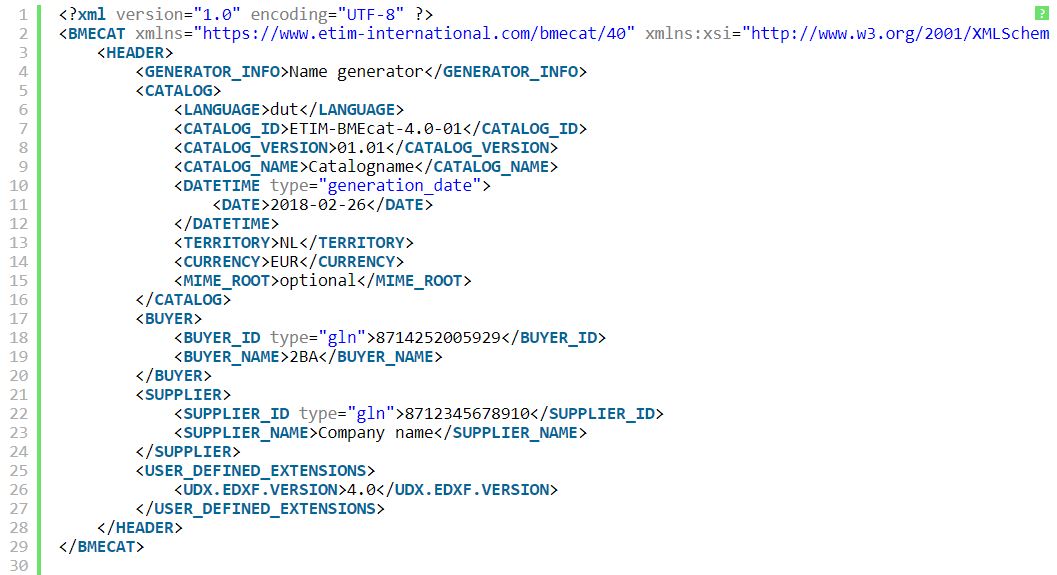
- GENERATOR_INFO has to contain the name of the PIM software or BMEcat generator.
- LANGUAGE will be used as default language when no language is set at the description elements. The use of language codes at the descriptions is highly recommended!
- MIME_ROOT is optional, if the local attachments are stored in a folder, the folder name should be filled in.
- BUYER_ID specifies the GLN number of the specific datapool;
- 2BA: <buyer_id type="gln">8714252005929</buyer_id>
- InstallData: <buyer_id type="gln">8714252005929</buyer_id>
- SUPPLIER_ID is a mandatory field within the datapool. The GLN- or DUNS number is of the specific data supplier is expected;
-
- GLN: <buyer_id type="gln"><buyer_id>
- DUNS: <buyer_id type="duns"><buyer_id>
- <UDX.EDXF.VERSION>4.0</UDX.EDXF.VERSION> must be used to define the ETIM 4.0 Guideline version.
Transaction settings
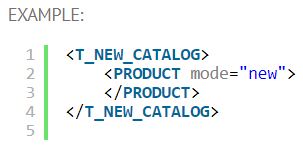
Identification
| SUPPLIER_PID | Trade item number |
| UDX.EDXF.GTIN | GTIN article |
| MANUFACTURER_PID | Product number (smallest unpacked unit) |
| INTERNATIONAL_PID type="gtin" | GTIN product |
Multiple packing units for the same product
- UDX.EDXF.QUANTITY_MIN must be equal to UDX.EDXF.QUANTITY_MAX.
- Every type of package must have an unique SUPPLIER_PID. If there is no unique supplier_PID, fill the GTIN as Supplier_PID.
- The structure with package information (UDX.EDXF.PACKING_UNIT) can only be used once per unique trade item number.
- Normally, the complete product structure must be given for every unique trade item number (from to ). In case of multiple packing units, there is one exception: when a reference to a MANUFACTURER_PID is used more than once (from more than one SUPPLIER_PIDs), after the first appearance the fields below don't have to be given in order to avoid redundant information:
-
- Attachments: UDX.EDXF.MIME_INFO
- ETIM classification: PRODUCT_FEATURES
- ETIM version: UDX.EDXF.PRODUCT_ETIM_DYNAMIC
- ETIM MC classification: UDX.EDXF.PRODUCT_FEATURES_MC
- Brand, series, type: will be ignored during the import
Logistic information
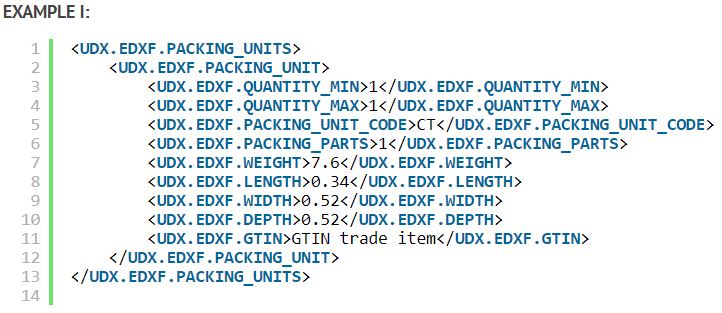
- ETIM has determined that C62 is interpreted as unpacked
- ETIM has determined that PA is interpreted as blister
- Not recommended by InstallData:
- BE (Bundle)
- PR (Pair)
- SET (set)
- Z2 (Chest)
- Z3 (Cask)
Order price details
| Datamodel: | Formula: | |
|---|---|---|
| QuantityOfUseUnits | = | NO_CU_PER_OU * UDX.EDXF.QUANTITY_MIN |
| Gross price | = | PRICE_FACTOR * PRICE_AMOUNT |
| Gross price per purchase unit | = | (PRICE_FACTOR * PRICE_AMOUNT) / PRICE_QUANTITY |
| Gross price per content unit | = | ((PRICE_FACTOR * PRICE_AMOUNT) / PRICE_QUANTITY) / NO_CU_PER_OU |

Descriptions
- DESCRIPTION_SHORT is used as default description. The maximum field length within the data pool is 70 characters (not 150 characters according to the XSD of BMEcat). If the short description contains more characters the description will be cut to length of 70 characters.
- DESCRIPTION_LONG is mapped to the marketing text with a maximum of 1.000 characters. If the long description contains more characters, the description will be cut to specified length of 1.000 characters.
- The long description to support the short description is defined in the country specific UDX.EDXF.PRODUCT_CHARACTERISTIC "Long ERP description" with code "NL_008" and has a maximum of 256 characters.
- The descriptions (short, long and long ERP description) should not contain controls characters like CR & LF (Enter / Return), tabs, and other non-western characters.

- The descriptions (short, long and long ERP description) should not contain any HTML tags or font formatting like bold, italic, underline, etc.
- The element LANGUAGE in the header is used as default language when no language code is specified at descriptions.
- The default language is Dutch and will be therewith mandatory. If no Dutch description is set, the English description will be adopted as Dutch description.
- If neither a Dutch or an English description is not specified the specific record will blocked.
- Brand; UDX.EDXF.BRAND_NAME
- Series; UDX.EDXF.PRODUCT_SERIES
- Type; UDX.EDXF.PRODUCT_VARIATION
Hazardous substances and certificates
- The indication that SDS is applicable for this product in SPECIAL_TREATMENT_CLASS.
- There must be an attachment with code MD03 in UDX.EDXF.MIME.
- The SDS listdata must be filled in the UDX.EDXF.PRODUCT_CHARACTERISTIC with code NL_005.

- The indication that REACH is applicable for this product in UDX.EDXF.REACH.INFO.
- The REACH revision date must be filled in the UDX.EDXF.REACH.LISTDATE.
- There must be a website location to the document, given as attachment with code MD05 in UDX.EDXF.MIME.


ETIM Classification
- REFERENCE_FEATURE_GROUP_ID is the ETIM class of the product. According to the 4.0 guidelines this field is mandatory and must be filled with "EC000000" if the product has no known ETIM class. For InstallData this field is not mandatory.
- FNAME is the ETIM Feature. According to the 4.0 guidelines this field is mandatory and must be filled with "EF000000" when there is no feature. For InstallData this field is not mandatory.
- FVALUE is the ETIM value. According to the 4.0 guidelines this field is mandatory and must be filled with "EV000000" when there is no feature. For InstallData this field is not mandatory.
- In case of a range, the element FVALUE is used twice. InstallData will use the first element as the lowest value, and the second value as the highest.
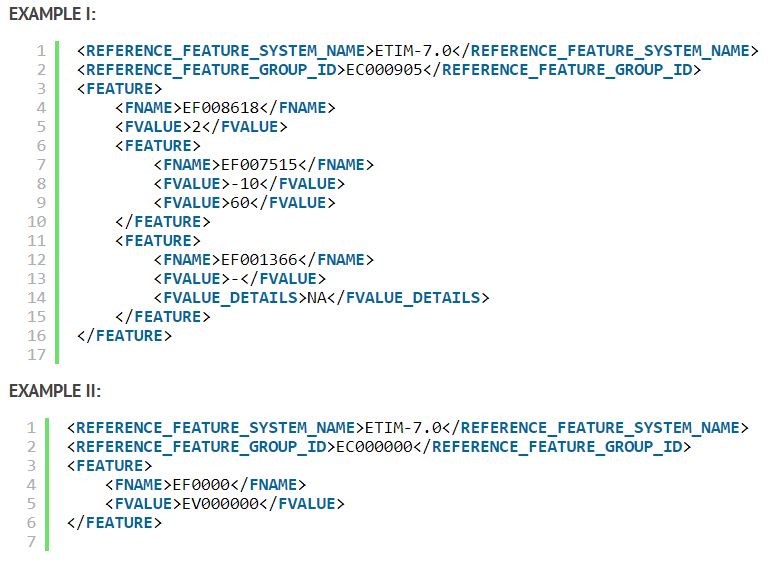
MIME Information
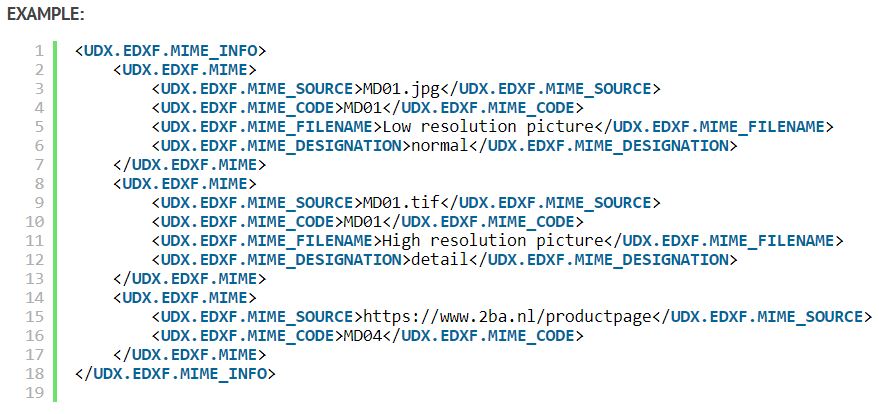
Reference items
| BMEcat code: | BMEcat description: | Datamodel code: | Datamodel description: | Datamodel description: |
|---|---|---|---|---|
| accessories | Accessories | BE2 | Belongs to | |
| simular | Similar product | COM | Alternative | |
| consists of | Component part | CON | Contains part | |
| others i.c.m. "fits to" | Other reference type >> fits to | FI2 | Technical fit | |
| followup | Follow-up successor | PCH | Successor | |
| mandatory | Mandatory additional product | KNZ | Can not without | |
| select | Selectable mandatory product | KNZ | Can not without | |
| sparepart | Spare part | RES | Spare | |
| base_product | Base product | no mapping | no mapping | |
| others | Others | no mapping | no mapping |
Files containing data from multiple data suppliers
You can log on at https://www.feebel.be/nl/aanmelden






 Follow us on LinkedIn
Follow us on LinkedIn